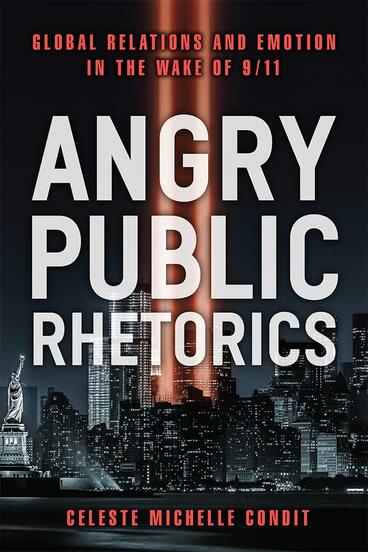Angry Public Rhetorics
Global Relations and Emotion in the Wake of 9/11
Explores the power of anger in how rhetoric can motivate-or hinder-public perceptions of events
Description
In Angry Public Rhetorics, Celeste Condit explores emotions as motivators and organizers of collective action—a theory that treats humans as “symbol-using animals” to understand the patterns of leadership in global affairs—to account for the way in which anger produced similar rhetorics in three ideologically diverse voices surrounding 9/11: Osama bin Laden, President George W. Bush, and Susan Sontag.
These voices show that anger is more effective for producing some collective actions, such as rallying supporters, reifying existing worldviews, motivating attack, enforcing shared norms, or threatening from positions of power; and less effective for others, like broadening thought, attracting new allies, adjudicating justice across cultural norms, or threatening from positions of weakness. Because social anger requires shared norms, collectivized anger cannot serve social justice. In order for anger to be a force for global justice, the world’s peoples must develop shared norms to direct discussion of international relations. Angry Public Rhetorics provides guidance for such public forums.
Celeste M. Condit is Distinguished Research Professor in the Department of Communication Studies at the University of Georgia.
Reviews
“A primary contribution of this scholarly work is that it represents one of the only (if not the only) systematic, book-length studies comparing the public discourse surrounding 9/11, including the public rhetoric of those who expressed moral outrage at the American response to the terrorist attacks. But in addition to this, the book also expertly draws upon and synthesizes a wide range of psychological, philosophical, and rhetorical theories of, and perspectives on, emotion (and the emerging term, affect), up to and including the ‘new realism/materialism.’ Professor Condit’s book is important, too, because her overall approach to angry rhetoric informs even more recent public displays of angry rhetoric, as they have been associated with responses to numerous ‘home-grown’ terrorist attacks since 9/11 and with the so-called discontent that contributed to the 2016 presidential election.”
—Kenneth Zagacki, North Carolina State University
“In this important book about debilitating and violent entailments of anger in public rhetoric, I am intrigued mostly by Celeste Condit’s reflections on the possibilities of deploying our constructive symbolic capacity to overcome anger’s ‘narrowing forces.’ The book inclines toward a pragmatic vision of democratic deliberation in multiple global forums.”
—Robert L. Ivie, Indiana University, Bloomington
“With Angry Public Rhetorics, Celeste Condit shows what transdisciplinary research can do. What emerges in these pages is an account of anger as it burns through global public discourse, soldering people together with its energy, its heat, and—perhaps surprisingly, as Condit shows—its optimism. This book could not be more timely.”
—Debra Hawhee, McCourtney Institute for Democracy
“Angry Public Rhetorics is interesting, well-done analytically, and addresses important questions surrounding both post-9/11 American politics and the politics of global emotions more generally. The book offers new insights regarding the dynamics and implications of anger to make a fine contribution.”
—Ty Solomon, University of Glasgow

